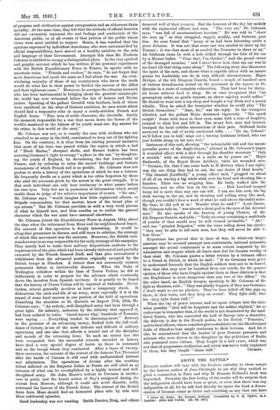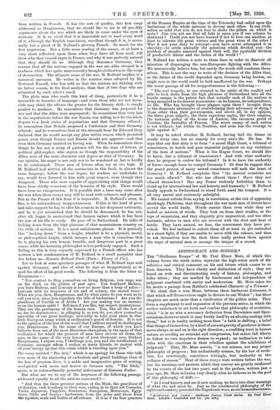ABOVE THE BATTLE.•
Elicusu readers will turn with the liveliest curiosity to these essays by the famous author of Jean-Christophe to see why they excited so great a commotion in Paris and why M. Romain Rolland's book was boycotted. Probably the first feeling of the reader will be surprise that the indignation should have been so great, or oven that there was any indignation at all, for he will find directly he opens the book a denun- ciation of German crime as bitter and searching as any that can have • Above the Battle. By Romaln Rolland. Translated by O. B. Ogden, M.A. London : Allen and Unvtin. [2s. lid. net.]
been written in French. It has the sort of quality, this first essay addressed to Hauptman, that we should like to see in all pro-Ally arguments about the war which are likely to come under the eyes of neutrals. It is so vivid that it is impossible not to read every word of it, although the English translation, excellent though it is, is neces- sarily but a ghost of M. Rolland's glowing French. So much for the first impression. But a little more reading of the essays, or at least a very short reflection upon them when they have all been read, will show why they caused anger in France, and why it was perfectly natural that they should do so. Although they denounce Germany, they assume that all the nations engaged in the war are alike steeped in a madness which has quite unnecessarily brought civilization to the verge of destruction. The ultimate cause of the war, M. Rolland implies, is a universal unreason. Ho writes in the manner since adopted by Mr. Bertrand Russell, who has told us that the nations are fighting with no better reason, in the final analysis, than that of two dogs who are infuriated by each other's smell.
The plain man who reads this kind of thing, particularly if he is insensible to beauties of language—and even those who are not insen- sible may think the offence the greater for the literary skill—is simply goaded to madness. He remembers that Germany was prepared for war and that the Allies were unprepared ; he remembers that very late in the negotiations beforo the war Russia was willing to refer the whole dispute to a fresh series of negotiations and that Germany refused ; he remembers that Britain proposed a Conference and that Germany refused ; and he remembers that at the eleventh hour Sir Edward Grey declared that he would accept any plan within reason which promised peace, even though Franco and Russia should not approve—and that
even then Germany insisted on having war. When he remembers these things he has not a scrap of patience left for the man of letters, or political philosopher, who argues as though the responsibility of the Allies wore of the same character and degree as that of Germany. In our opinion, his anger is not only not to be wondered at, but is hardly to be condemned. These men of letters often try us too high. If M. Rolland had written all the sentiments in this book, in almost the same language, before the war began, his readers, wo undertake to say, would have listened to him with great respect, even though they disagreed. Those who were capable of appreciating such things would have been chiefly conscious of the beauties of his style. There would have been no exasperation. It is possible that a time may come after the war when these essays may still be read with calmness and pleasure. But in the France of this hour it is impossible. M. Rolland's error, in fine, is his extraordinary inopportuneness. If this is the kind of give- and-take support he has to offer his country in her desperate extremity, and he is yet astonished that he should be denounced, he has not, after all, begun to understand that human nature which it has been the aim of his life to study. He goes off to Switzerland. He talks of looking down from the high plateaus of that mountainous country on the strife of nations. It is a most unfortunate phrase. It is precisely this " looking down " from a height, whether it be a physical, moral, or philosophical height, which enrages a man who is conscious that he is playing his own honest, humble, and dangerous part in a great cause, while his lecturing philosopher is less perilously engaged. Such a feeling as this is very cogently expressed by a French officer who has written a hot condemnation of M. Rolland in a small pamphlet that lies before us—Remain Rolland Parle (Paris : Floury et Cie.).
Let us look at some specimen passages of what M. Rolland says well against Germany, and also of what he says so inopportunely as to spoil the effect of his good words. The following is from the letter to Hauptmann :—
" Not content to fling yourselves on living Belgium, you wage war on the dead, on the glories of past ages. You bombard Malines, you burn Rubens, and Louvain is now no more than a heap of ashes— Louvain with its treasures of art and of science, the sacred town ! What are you, then, Hauptmann, and by what name do you want us to call you now, since you repudiate the title of barbarians ? Are you the grandsons of Goethe or of Attila ? Are you making war on enemies or on the human spirit ? Kill men if you like, but respect masterpieces. They are the patrimony of the human race. You, like all the rest of us, are its depositories ; in pillaging it, as you do, you show yourselves unworthy of our great heritage, unworthy to take your place in that little European army which is civilisation's guard of honour. It is not to the opinion of the rest of the world that I address myself in challenging you, Hauptmann. In the name of our Europe, of which you have hitherto been one of the most illustrious champions, in the name of that civilisation for which the greatest of men have striven all down the ages, in the name of the very honour of your Germanic race, Gerhart Hauptmann, I abjure you, I challenge you, you and the intellectuals of Germany, amongst whom I reckon so many friends, to protest with all your energy against this crime which is recoiling upon you."
The essay entitled " Pro Aris," which is an apology for those who talk even more of the shattering of cathedrals and grand buildings than of the loss of precious lives, is a noble and imaginative piece of writing, steel-girded with scorn and horror at German acts. " The Idols," again, is an extraordinarily powerful indictment of German Sulfur.
But what are we to say of the ineptness of the following passage, addresied equally to all the nations concerned?—
"And thus the three greatest nations of the West, the guardians of civilisation, rush headlong to their ruin, calling in to their aid Cossacks, Turks, Japanese, Cingalese, Soudaneso, Senegalese, Moroccans, Egp- tians, Sikhs and Sepoys—barbarians from the poles and those from the equator, souls and bodies of all colours. It is as if the four quarters of the Roman Empire at the time of the Tetrarchy had called upon the barbarians of the whole universe to devour each other. Is our civili- sation so solid that you do not fear to shake the pillars on which it rests ? Can you not see that all falls in upon you if one column be shattered f Could you not have learned if not to love one another, at least to tolerate the great virtues and the great vices of the other ? Was it not your duty to attempt—you have never attempted it in sincerity—to settle amicably the questions which divided you—the problem of peoples annexed against their will, the equitable division of productive labour and the riches of the world ? "
M. Rolland has written a note to these lines in order to disavow all intention of disparaging the non-Europeans fighting with the Allies. We unreservedly believe him, but surely the words still condemn them- selves. This is not the way to write of the decision of the Allies that, as the future of the world depended upon Germany being beaten, no single race in the world could be held unaffected by the war. Perhaps the worst passage of all for inopportuneness is the following :-
" The real tragedy, to one situated in the midst of the conflict and able to look down from the high plateaus of Switzerland into all the hostile camps, is the patent fact that actually each of the nations is being menaced in its dearest possessions--in its honour, its independence, its life. Who has brought these plagues upon them ? brought them to the desperate alternative of overwhelming their adversary or dying ? None other than their governments, and above all, in my opinion, the three great culprits, the three rapacious eagles, the three empires, the tortuous policy of the house of Austria, the ravenous greed of Tsarism, the brutality of Prussia. The worst enemy of each nation is not without, but within its frontiers, and none has the courage to fight against it."
It may be asked whether M. Rolland, having laid the blame on nearly every one, has no remedy for every one's ills. He has. He says that our first duty is to form " a moral High Court, a tribunal of consciences, to watch and pass impartial judgment on any violations of the laws of nations." What is the Hague Court, we should like to know, but a tribunal of consciences ? And with what authority does he propose to endow his tribunal ? Is it to have the authority of force—enough force to compel Germany ? Or does he suggest that the grand protest of many united consciences will melt the heart of Germany Y M. Rolland complains that " the neutral countries are too much effaced." But who has effaced them ? Have they not effaced themselves ? Has any Power violently forbidden them to stand up for international law and honesty and humanity ? M. Rolland finally appeals to Switzerland to stand forth amid the tempest. It is all very unreal and extremely unhelpfuL
We cannot refrain from saying, in conclusion, at the risk of appearing shockingly Philistine, that throughout the war most men of letters have served the world badly. Words master them even while they are hailed as masters of words. They look on from their studies, or the tops of mountains, and they elegantly give unpractical, and too often fantastic, advice to mon who are covered with the dust and heat of battle. They have earned, we fear, the resentment they have pro- voked. We feel inclined to exhort them all at least to get embroiled in a street fight, if they are unable to serve with the colours, and then to ask themselves how far their ideas really protect them against the ways of natural men or assuage the temper of a crowd.































 Previous page
Previous page